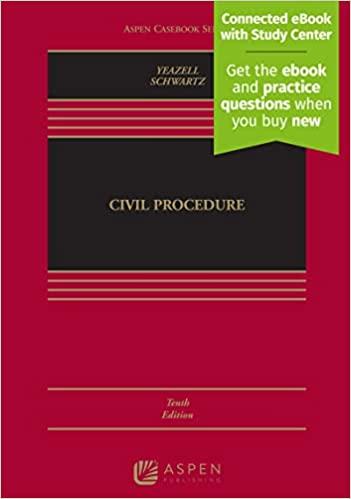Question
1. Many courts still do not rely heavily on cyber-filing, cyber-messaging, and cyber-discovery. True or False 2. Private civil trials are not an ADR technique,
1. Many courts still do not rely heavily on cyber-filing, cyber-messaging, and cyber-discovery.
True or False
2. Private civil trials are not an ADR technique, but are private trials held by a retired judge.
True or False
3. Arbitration hearings are conducted in conformance with the state's rules of civil procedure where the hearing is being held.
True or False
4. Jurors who serve on juries at private civil trials are generally selected from
a. the friends of the litigants.
b. those who recently served on an official jury.
c. law students or paralegal students.
d. a general jury pool.
5. Which of the following is true of med-arb?
a. The parties submit their dispute to med-arb attorneys before opting for a civil litigation.
b. The parties present their dispute to a mixed panel of mediators and arbitrators.
c. The parties first submit their dispute to an arbitration session, before moving to mediation.
d. The parties move to an arbitration hearing with any undecided issues after mediation.
6. Alternative dispute resolution (ADR) is often more expensive than litigation, but is also more efficient.
True or False
7. A third party who actually settles a dispute between other parties is called a(n) __________.
a. prosecutor
b. arbitrator
c. litigant
d. negotiator
e. mediator
8. Cyber alternative dispute resolution is also known as electronic dispute resolution.
True or False
9. Anti-collective science court analysts argue that the Court of Appeals for the Federal Circuit is already in place to handle patent claims in an effective and efficient manner; therefore, there is not a need for an additional court.
True or False
10. Which of the following statements is true about summary jury trials? a. There is no communication between the litigants and the jurors before, during, or after a summary jury trial.
b. The lawyers from both the parties present a detailed version of the case to an actual jury.
c. The judge and the jury focus on the essentials of the case during a summary jury trial.
d. The parties have strict time limits to present their case and disputes before the judge and the jury.
11. Early neutral evaluation can be defined as a
a. process in which the parties hire a retired judge or a magistrate to hear their dispute, following the rules of an official trial.
b. non-binding process where a neutral third party works with the parties to reach a mutually agreeable settlement.
c. process in which the parties permit a referee to assess their case on the basis of facts and legal arguments alone.
d. process conducted in less than a day before an actual jury renders an advisory verdict in the case.
12. In a summary jury trial, the verdict is advisory.
True or False
13. Judges on the collective science court are retired judges who have a background, but no special training, in science.
True or False
14. Partnering attempts to deter the disorder that can arise during a dispute by drawing up certain ground rules that all parties agree to observe.
True or False
15. Which of the following is initiated and supervised by a court?
a. Arbitration
b. Mediation
c. A private civil trial
d. A summary jury trial
16. Litigation can be expensive because of the initial steps of filing a lawsuit.
True or False
17. __________ is an ADR technique in which a third party or parties settle a dispute between the disputing parties in a binding manner.
a. Arbitration
b. Negotiation
c. Summary jury trial
d. Early neutral evaluation
e. Mediation
18. Since ADR techniques sidestep courts, many critical social issues fail to reach the judicial system.
True or False
19. A(n) __________ acts as a forum for disputes involving scientific and technological controversies.
a. summary jury trial
b. private civil trial
c. ethics court
d. pretrial conference
e. collective science court
Step by Step Solution
There are 3 Steps involved in it
Step: 1

Get Instant Access to Expert-Tailored Solutions
See step-by-step solutions with expert insights and AI powered tools for academic success
Step: 2

Step: 3

Ace Your Homework with AI
Get the answers you need in no time with our AI-driven, step-by-step assistance
Get Started


